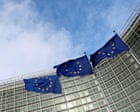
The world stage is currently witnessing several critical developments, from humanitarian concerns in the Middle East to educational advancements and environmental initiatives. Each of these events carries a potential impact on our global community, underscoring the interconnectedness of our modern age.
In a significant move, the European Commission has put forward a proposal to suspend Israel’s involvement in parts of the Horizon Europe research programme, a prestigious initiative with an approximate budget of €80 billion dedicated to scientific exploration and innovation. This proposal emerges amid heightened international scrutiny and concern over the humanitarian plight in Gaza. The Integrated Food Security Phase Classification, headlining as a leading authority on global food crises, has starkly reported the onset of a famine scenario in Gaza, demanding urgent attention. These developments have drawn responses from various global leaders, including an appeal for increased humanitarian aid to the region.
Concurrently, innovation in educational technology is paving a new path for academia, marked by the launch of a “study mode” feature in ChatGPT. Developed to foster a responsible approach to academic usage of AI, this feature acts as a supportive tool rather than simply providing answers or generating essays. Users can engage with academic material through a stepwise, lesson-like format, allowing for an enriched learning experience that emphasizes understanding over rote completion. As AI continues to evolve, such initiatives help balance technological advancement with ethical responsibility, ideally reducing academic misuse while promoting genuine learning and comprehension.
In another forward-looking initiative, the Azores have been chosen as the site for the upcoming Atlantic Climate Observatory, slated for installation in 2027. This project highlights the proactive dedication of the Azorean leadership to climate monitoring and innovation. Regional authorities emphasize their commitment to the Earth’s ecological health, positioning the Azores as a hub for environmental research and sustainable innovation. The observatory will serve as a vital tool in understanding and addressing the intricate dynamics of climate change, offering critical data to help mitigate the environmental challenges facing our planet.
Each of these initiatives underscores the various global sectors—political, educational, and environmental—actively seeking solutions to pressing challenges. They illustrate a determination to harmonize development with ethical considerations, keeping in mind the well-being of future generations. As the European Union deliberates on its diplomatic and economic measures concerning humanitarian concerns, educational technologies adapt to preserve the integrity of academia, and the Azores prepare to become a crucial point for climate study, the collective momentum towards positive global change becomes evident.
As these stories unfold, they remind us of the multifaceted efforts across the world aimed at fostering improvement and understanding. It is a time to reflect on the interdependent nature of our global societies and the roles we play, individually and collectively, in shaping a compassionate and sustainable future. Let us progress with mindfulness, integrating technology, policy, and initiative in ways that uplift the human spirit and the condition of our world.
Source: {link}
